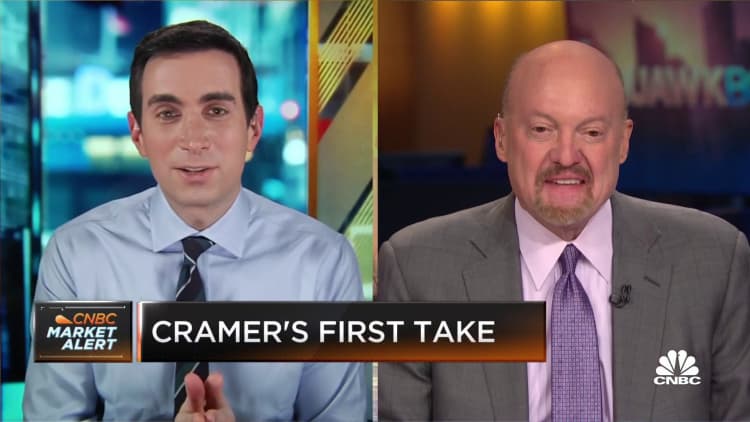Wall Street has a new investment darling. And while financiers stand to reap big profits, there are reasons for mom-and-pop investors to tread lightly.
The investments — SPACs, or special purpose acquisition companies — are kind of like quasi-IPOs:
A publicly traded shell company uses investor money to buy or merge with a private company, typically within two years. In so doing, the private company becomes publicly traded. If there's no deal within the specified time limit, investors get their money back.
More from Personal Finance:
Tax season has started. Many still looking for $600 stimulus check
Biden extends protections for homeowners
Bulk of jobless claims are due to repeat pandemic layoffs
SPAC proponents see them as a form of venture capital that may let investors get a piece of high-growth start-ups at an early stage. There's also some loss protection, depending on when investors buy in.
But SPACs are also known as "blank check" funds — because investors give money to a manager without knowing what company they may ultimately acquire. Managers may identify specific industry or business targets in initial filings but aren't obligated to pursue them, essentially giving them carte blanche.
In some cases, investors may by buying a manager's star power.

The roster of SPAC sponsors includes, for example: Bill Ackman, the renowned hedge fund manager; former House speaker Paul Ryan; ex-Trump economic advisor Gary Cohn; and sports icons like Shaquille O'Neal, Alex Rodriguez and Colin Kaepernick.
"You're investing in people," Michael McClary, chief investment officer at ValMark Financial Group, said. "The trust level is through the roof.
"Right now, we're putting [SPACs] in a bucket with gold and bitcoin," he added. "It's highly speculative. And there's no financial analysis you can really do."
'Exploding' market
The investment pools aren't new. But they've ballooned in popularity.
SPAC initial offerings quadrupled last year to 248, according to Jay Ritter, a finance professor at the University of Florida. The IPOs are on pace to quadruple again in 2021, he said.
They raised almost $26 billion last month, a record.
"The market is exploding," Ritter said.
The SPAC boom may end up bringing a lot of earlier stage, much riskier companies to market.Michael Cembalestchairman of market and investment strategy for J.P. Morgan Asset Management
Retail investors seem to be driving much of the frenzy — as they did with other recent manias like GameStop stock.
But the video-game retailer offers a cautionary tale for investors trying to capitalize on a hot-ticket item: The stock surged 1,700% in less than a month; it promptly lost most (85%) of its value in the next two weeks.
In the case of SPACs, retail investors seem to be chasing past returns, according to Ritter.
SPACs listed this year had a 6.1% average first-day return — about six times the average over 2003-20, Ritter said.
"If things hadn't gone so well the last six months, I don't think we'd be seeing this boom," he said.
Reasons for caution
There are reasons for caution, according to financial experts.
More and more, mom-and-pop investors aren't buying shares at SPACs' initial listing price, Ritter said. (They typically list at $10 a share.) Retail investors that don't get in early won't participate as much — or at all — in that initial share-price pop.
A key selling point of SPACs has been their money-back guarantee, which limits downside risk. Investors can choose to redeem their shares when a merger or acquisition is announced, rather than become shareholders in the combined entity.
However, investors won't necessarily recoup everything. They're entitled to $10 a share plus some interest. If they bought higher-priced shares on the open market — say, for $12 — they'd take a loss (around $2 per share, in this example). Shares in the combined entity may also fall below $10 when they start trading.
"Just like with anything, there could be some risks," said Marguerita Cheng, a certified financial planner and CEO of Blue Ocean Global Wealth in Gaithersburg, Maryland. "They're not appropriate for everybody in every situation."
SPAC returns
Returns also haven't been stellar when measured against standard benchmarks, according to experts.
The typical buy-and-hold SPAC investor earned a 45% gross return between January 2019 and 2021, Michael Cembalest wrote in a recent JPMorgan analyst note. (The analysis measures returns for the median investor.)
However, investors would have earned a higher return in the S&P 500 stock index, which yielded 52% over the same time period.
"Good absolute returns so far but in bull equity markets, rising tides lift all boats," said Cembalest, the chairman of market and investment strategy for J.P. Morgan Asset Management, suggesting SPACs are piggybacking off a strong stock market.
The typical SPAC fund manager also earned far more money than investors — a 682% return over that two-year time horizon, according to Cembalest.
That's due partly to the funds' structure: Managers typically get a 20% stake in the acquired company for little upfront cost. They don't get anything if a deal doesn't materialize, however.
They therefore have an incentive to make deals. Good ones may be harder to come by in a market flooded with investor capital.
"The SPAC boom may end up bringing a lot of earlier stage, much riskier companies to market," according to Cembalest.


